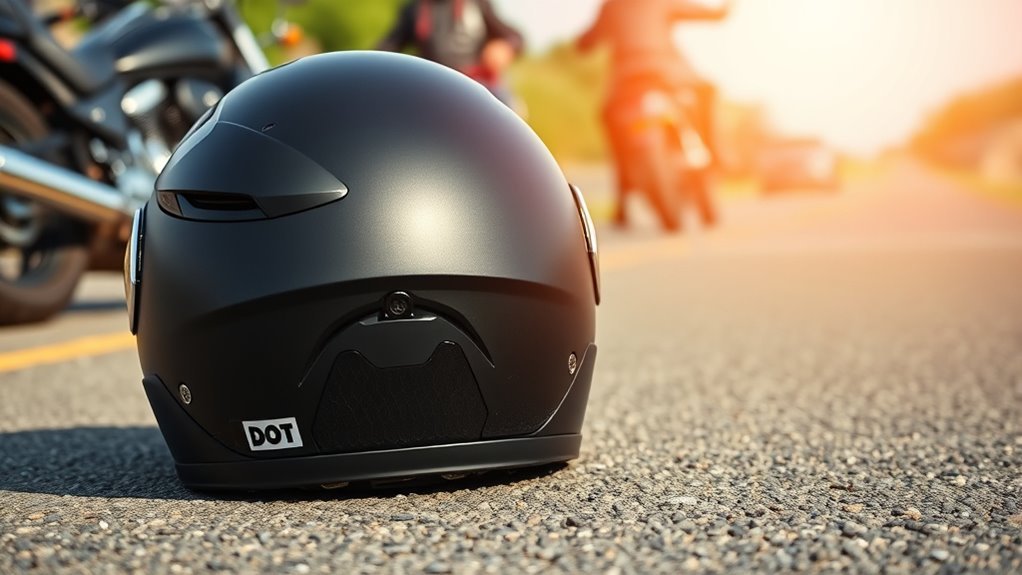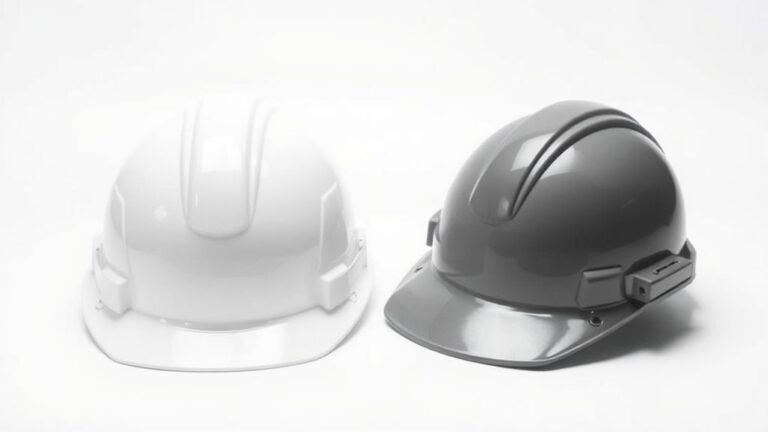Importance of DOT Certification in Motorcycle Helmets
DOT certification is essential for motorcycle helmets as it guarantees they meet rigorous safety and performance standards. These helmets undergo extensive testing for impact resistance and retention, greatly reducing the risk of head injuries during accidents. Choosing a DOT-certified helmet means prioritizing your safety on the road, as not all helmets offer the same level of protection. Understanding the intricacies of these certifications can help you make a well-informed decision about your headgear.
Understanding DOT Certification Standards

When you choose a motorcycle helmet, understanding DOT certification standards is vital for your safety. The Department of Transportation (DOT) establishes regulations that helmets must meet to guarantee adequate protection in case of an accident. The certification process involves rigorous testing for impact resistance and retention, verifying that the helmet can withstand real-world conditions. Helmets bearing the DOT label have passed these stringent criteria, providing you with a level of assurance as you ride freely. It’s important to recognize that helmets not meeting these standards might compromise your safety on the road. By selecting a DOT-certified helmet, you’re not just complying with regulations; you’re prioritizing your well-being, allowing you to enjoy the ride with confidence.
The Role of Helmets in Motorcycle Safety

Although many riders underestimate their importance, helmets play an essential role in motorcycle safety by greatly reducing the risk of head injuries during accidents. Effective helmet design is fundamental; a well-engineered helmet absorbs impact, disperses force, and protects crucial areas of the head. You need to recognize that rider awareness is equally important; being vigilant on the road can help prevent accidents in the first place. Combining a high-quality helmet with increased awareness creates a safer riding experience. Regulatory standards, like those set by DOT, guarantee helmets meet specific performance criteria, enhancing safety. Remember, your freedom on the open road is best enjoyed when you prioritize your safety with the right gear and an informed mindset.
How DOT Certification Impacts Helmet Performance

While many riders may overlook the significance of certification, DOT (Department of Transportation) standards are essential for guaranteeing helmet performance and safety. These regulations set rigorous criteria that helmets must meet through certification testing, ultimately impacting your riding experience. Understanding how DOT certification influences helmet performance can enhance your freedom on the road.
Here are four key aspects:
- Impact Resistance: DOT-certified helmets endure high-impact tests, providing superior protection during crashes.
- Penetration Resistance: These helmets resist sharp objects, safeguarding your head in unpredictable conditions.
- Retention System Strength: Certification guarantees the chin strap withstands significant force, keeping the helmet securely in place.
- Field of Vision: DOT standards assure adequate visibility, promoting awareness and safety while you ride.
Common Myths About DOT Certification
Many riders mistakenly believe that DOT certification guarantees absolute safety and performance in motorcycle helmets. While DOT certification is important, it doesn’t account for all safety aspects, such as fit, materials, or design flaws. Understanding these certification misconceptions is fundamental for your safety on the road. Let’s break down some common myths through this table:
| Myth | Reality | Impact on Riders |
|---|---|---|
| DOT cert means top safety | Certification doesn’t guarantee all risks | False sense of security |
| All DOT helmets are equal | Varies by brand and model | Misleading choices |
| Only DOT matters | Other certifications exist | Ignoring additional safety features |
Myth debunking is essential for informed choices. Stay aware, and prioritize thorough helmet evaluation for your freedom on the road.
Key Features to Look for in DOT-Certified Helmets
When selecting a DOT-certified helmet, it’s vital to guarantee it complies with established safety standards. Look for helmets that have undergone rigorous impact resistance testing, as this is fundamental for effective protection. Understanding these key features can greatly influence your safety on the road.
Safety Standards Compliance
DOT-certified helmets must meet specific safety standards to guarantee maximum protection for riders. Understanding these safety regulations is vital in the certification process, making sure the helmet can withstand real-world impacts. Here are some key features to look for in DOT-certified helmets:
- Material Quality: Verify the shell is made from durable materials that can absorb impact.
- Fit and Comfort: A proper fit enhances safety; check for additional padding and adjustable straps.
- Visibility: Look for helmets with reflective elements to increase visibility at night.
- Ventilation: Adequate airflow keeps you comfortable, especially during long rides.
Impact Resistance Testing
Although a helmet may look appealing, its effectiveness largely hinges on rigorous impact resistance testing that guarantees it can withstand sudden collisions. DOT-certified helmets undergo stringent impact testing to assess their ability to absorb energy from crashes. This testing is essential for helmet durability, ensuring that the materials used can withstand high-velocity impacts without compromising safety. When choosing a helmet, look for those that have passed these tests, as they’ve demonstrated their capability to protect your head in real-world scenarios. Remember, a helmet that meets DOT standards isn’t just a stylish accessory; it’s a critical piece of gear that enhances your freedom on the road while prioritizing your safety. Invest wisely, as your life depends on it.
The Consequences of Choosing Non-Certified Helmets
Choosing a non-certified helmet can have dire consequences, not only compromising your safety but also potentially violating legal regulations. When you opt for a non-certified helmet, consider the following risks:
- Inadequate Protection: Non-certified helmets may lack essential features for helmet safety, increasing injury risk during accidents.
- Legal Issues: Riding with a non-compliant helmet can lead to fines or penalties, depending on local laws.
- Insurance Complications: If you’re injured while wearing a non-certified helmet, your insurance may deny claims, citing negligence.
- False Sense of Security: You might feel safe, but without certification, you’re relying on unverified claims about protection.
Understanding the certification importance is vital for safeguarding your freedom on the road. Don’t take chances with your life; choose wisely.
Frequently Asked Questions
How Can I Verify if a Helmet Is DOT Certified?
To verify if a helmet’s DOT certified, check for the DOT sticker inside the helmet. This label indicates compliance with helmet safety standards set by the Department of Transportation. You can also research the manufacturer’s website or trusted safety organizations for certification details. If you’re considering a purchase, confirm it meets these standards; it’s essential for your safety and freedom on the road. Always prioritize helmet certification verification before riding.
Are There Any Age Restrictions for Wearing Dot-Certified Helmets?
There aren’t specific age restrictions for wearing DOT-certified helmets, but helmet safety is vital for riders of all ages. It’s important to verify that the helmet fits properly and meets safety standards. While laws may vary by state regarding helmet use, prioritizing safety by wearing a DOT-certified helmet is always wise. Regardless of your age, adopting good practices enhances your freedom on the road while minimizing risks associated with motorcycle riding.
Do All Motorcycle Helmets Require DOT Certification?
Not all motorcycle helmets require DOT certification, but it’s essential for helmet safety. While some states have specific regulations mandating certified helmets, others don’t. The certification process guarantees that helmets meet safety standards, providing you with the protection you need while riding. Choosing a DOT-certified helmet is a wise decision for those who value their freedom on the road, as it greatly enhances your safety and reduces the risk of injury.
Can I Wear a Dot-Certified Helmet for Other Activities?
Yes, you can wear a DOT-certified helmet for other activities, but it’s crucial to contemplate the specific safety standards for each use. While it meets regulatory requirements for motorcycle riding, other activities might have different helmet usage guidelines. For instance, sports like biking or skateboarding may require specialized helmets designed for those impacts. Always prioritize your safety and guarantee the helmet fits the activity’s demands to maintain peak protection.
What Should I Do if My Dot-Certified Helmet Is Damaged?
If your DOT-certified helmet’s damaged, it’s essential you act swiftly. Just as Odysseus navigated treacherous seas, you should explore helmet replacement options immediately. Check for manufacturer guidelines regarding repairs, but generally, significant damage calls for a full replacement. For minor issues, you might find helmet repair tips useful, like replacing the inner padding or visor. Remember, safety’s your ultimate freedom; a compromised helmet isn’t worth the risk on your next adventure.






